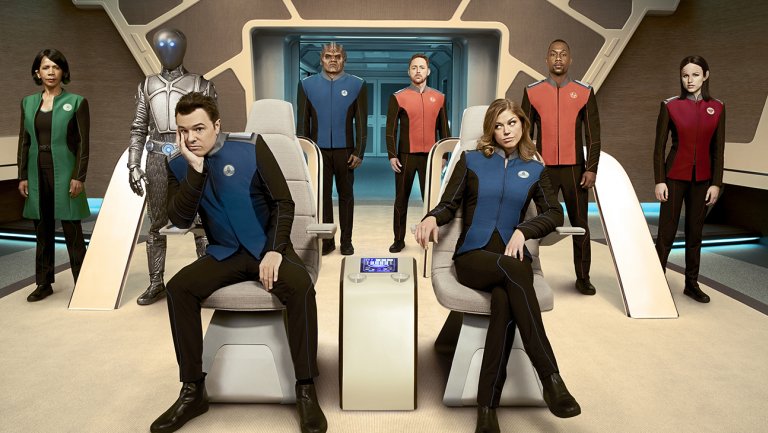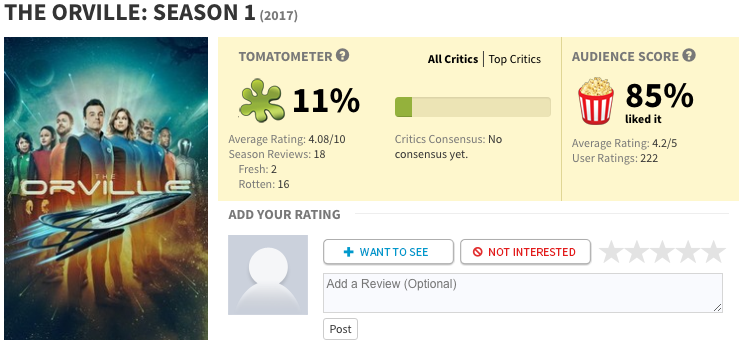"Orville" is the new Star Trek......and it's not half bad
I had my doubts about The Orville when I saw the first trailer months ago. I'm a fan of Family Guy, Ted, A Million Ways to Die in the West and crooner-style jazz so I dig Seth MacFarlane, but even knowing that he is a Trekkie I still wasn't sure if his new Star Trek parody was going to be anything to write home about.
As it turns out, The Orville is another one of those cases where I'm going to have to disagree with the critics. If you don't know what they are saying, let's check in with our favorite review aggregator straight from the Gates of Hell to see what the score is:
Yep. They hate it, and that's probably why I like it. That and the audience clearly disagrees with them yet again.
I know why the critics don't like it though and the reason is the most surprising thing to me about The Orville's first episode: It's a REAL show. Seriously.
What I mean by that is that it doesn't follow the same parody formula that MacFarlane has made himself known for since the first time FOX graced our presence with The Griffin Family nearly two decades ago. There's no cutaway gags, no overly disgusting sight gags and no commentaries that make fun of real life celebrities. Oh, there's plenty of jokes but the timing is much more reserved than anything you would come to expect from Family Guy, American Dad or any of MacFarlane's other creations for television and cinema.
I'm convinced that's what duped the critics into giving it a bad score that in my opinion, The Orville doesn't deserve. Don't get me wrong, it still suffers from "Pilot-itis" like almost every television show does when it launches, but there's more than enough there for me to be interested in the next episode.
The plot of The Orville is pretty straightforward. It's the early 25th century and MacFarlane is Ed Mercer, captain of the mid-level exploratory vessel Orville a year after an ugly divorce from his ex-wife Kelly, played by Adrianne Palicki, whom he caught cheating on him. That emotional event sent his career into a tailspin and the Orville is literally his last shot for him to have his dream job of commanding a starship. Eager to make a good impression, he brings his friend Gordon Malloy on board, played by Scott Grimes, as his helmsman and the crew sets out on its first mission to deliver supplies to a science colony. It's during that voyage that Mercer gets the twisty bad news: his new first officer that will be meeting them on the way to the colony is in fact his ex-wife, Kelly Grayson.
Thus begins the core of what The Orville seems to be centering its humanity around, which is real world awkwardness and situations that we as an audience can relate to in some form. We don't get an extended look at Kelly cheating on Ed outside of one quick revelatory scene at the very beginning and we don't see any of Ed's tailspin that sent his career toward oblivion as a result of it, but that actually pays off at the end of the pilot episode in a way that is just as unexpected as the rest of the show.
Seriously, The Orville is the new Star Trek for 2017 and beyond, meaning that it's written for a 21st century audience, but still retains a LOT of what Star Trek did as a television series for so long. In fact, watching the pilot was a strangely cathartic experience for me being a lifelong Trekkie as I was struck by at least 20 different things that the show absolutely takes from Star Trek not counting the uniforms, and it didn't help that Penny Johnson Jerald whom I know very well as Kasidy Yates from Star Trek: Deep Space Nine is now on this show as Doctor Claire Finn. There are subtle yet definitely deliberate changes to the technobabble, the visual effects are actually really good for a network television series and the show really does dial down the expected gluttony of humor in exchange for actually telling a solid story about human interactions, particularly about Ed and his ex-wife.
There's plenty of humanoid aliens just like in Star Trek, most notably Peter Macon's Lieutenant Commander Bortus, a member of the single-gendered Moclan species, and security chief Alara Kitan, a young and inexperienced Xelayan whose planet's higher gravity has given her a great deal of strength and power to use at her advantage, played by Halston Sage. There's J. Lee's John Lamarr, the human navigator that is sure to quickly become Gordon's partner in hijinks related crime, and the artificial life form Isaac from the planet Kaylon, who believes all biological life to be inferior, played by Mark Jackson.
What I mean about this show suffering from "Pilot-itis" is that generally speaking, pilot episodes of shows aren't nearly as engaging or get on a roll like second, third and fourth episodes of the show do and that's largely because it's a brand new idea that an audience has to get used to seeing. That's why judging shows based on a pilot alone is a terrible idea because after introducing people to what the tone, setting and characters are for the world, you need to give them a chance to see if they like seeing more of them after the introduction. The revelation that The Orville isn't a comedy-driven joke fest and is actually a show with serious emotional and dramatic intent with comedy sprinkled about it is enough of a reason for me to be interested in watching more of it and to recommend that people give it a shot for more episodes than just the pilot.
What will be interesting to see is how the general audience that has no connection to Star Trek reacts to the show. My perspective on it clearly is jaded in a sense because the show really does remind me a lot of Star Trek, right down to the orchestral music scores and I like that a lot. The question is, will it be enough to strike a chord with general audiences that might be just like the critics and wonder where all of the crass humor and cutaway gags are that they love in Macfarlane's other work? Only time will tell of course, but for now I'm hoping that it does strike a chord because I would hate to see a show like this end up as another FOX cutting board casualty before it even had a chance to breathe, and if The Orville gets that chance then it might just be the new Star Trek that builds a brand new audience around the concept of a solid space opera, something that we have been sorely missing on network television for a long time now.



